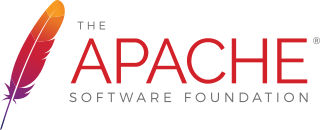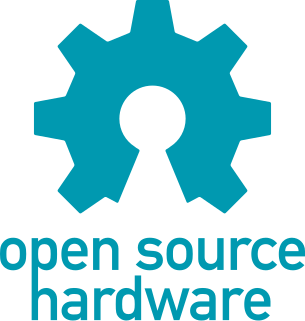
Bruce Perens is an American computer programmer and advocate in the free software movement. He created The Open Source Definition and published the first formal announcement and manifesto of open source. He co-founded the Open Source Initiative (OSI) with Eric S. Raymond. Today, he is a partner at OSS Capital.

Free software is computer software distributed under terms that allow users to run the software for any purpose as well as to study, change, and distribute it and any adapted versions. Free software is a matter of liberty, not price; all users are legally free to do what they want with their copies of a free software regardless of how much is paid to obtain the program. Computer programs are deemed "free" if they give end-users ultimate control over the software and, subsequently, over their devices.
The free software movement is a social movement with the goal of obtaining and guaranteeing certain freedoms for software users, namely the freedoms to run the software, to study the software, to modify the software, and to share copies of the software. Software which meets these requirements is termed free software.

The MIT License Variations is a permissive free software license originating at the Massachusetts Institute of Technology (MIT) in the late 1980s. As a permissive license, it puts only very limited restriction on reuse and has, therefore, high license compatibility. The Wikipedia and Wikimedia Commons projects use the alternative name Expat License.
An open-source license is a type of license for computer software and other products that allows the source code, blueprint or design to be used, modified and/or shared under defined terms and conditions. This allows end users and commercial companies to review and modify the source code, blueprint or design for their own customization, curiosity or troubleshooting needs. Open-source licensed software is mostly available free of charge, though this does not necessarily have to be the case.

The Open Source Initiative (OSI) is the steward of the Open Source Definition, the set of rules that define open source software. It is a California public benefit corporation, with 501(c)(3) tax-exempt status.
Viral license is an alternative name for copyleft licenses, especially the GPL, that allows derivative works only when permissions are preserved in modified versions of the work. Copyleft licenses include several common open-source and free content licenses, such as the GNU General Public License (GPL) and the Creative Commons Attribution-Sharealike license (CC-BY-SA).

The Apache License is a permissive free software license written by the Apache Software Foundation (ASF). It allows users to use the software for any purpose, to distribute it, to modify it, and to distribute modified versions of the software under the terms of the license, without concern for royalties. The ASF and its projects release their software products under the Apache License. The license is also used by many non-ASF projects.

Open-source software (OSS) is computer software that is released under a license in which the copyright holder grants users the rights to use, study, change, and distribute the software and its source code to anyone and for any purpose. Open-source software may be developed in a collaborative public manner. Open-source software is a prominent example of open collaboration, meaning any capable user is able to participate online in development, making the number of possible contributors indefinite. The ability to examine the code facilitates public trust into the software.

Open-source hardware (OSH) consists of physical artifacts of technology designed and offered by the open-design movement. Both free and open-source software (FOSS) and open-source hardware are created by this open-source culture movement and apply a like concept to a variety of components. It is sometimes, thus, referred to as FOSH. The term usually means that information about the hardware is easily discerned so that others can make it – coupling it closely to the maker movement. Hardware design, in addition to the software that drives the hardware, are all released under free/libre terms. The original sharer gains feedback and potentially improvements on the design from the FOSH community. There is now significant evidence that such sharing can drive a high return on investment for the scientific community.

Free and open-source software (FOSS) is software that is both free software and open-source software where anyone is freely licensed to use, copy, study, and change the software in any way, and the source code is openly shared so that people are encouraged to voluntarily improve the design of the software. This is in contrast to proprietary software, where the software is under restrictive copyright licensing and the source code is usually hidden from the users.
Multi-licensing is the practice of distributing software under two or more different sets of terms and conditions. This may mean multiple different software licenses or sets of licenses. Prefixes may be used to indicate the number of licenses used, e.g. dual-licensed for software licensed under two different licenses.

The Python Software Foundation License (PSFL) is a BSD-style, permissive free software license which is compatible with the GNU General Public License (GPL). Its primary use is for distribution of the Python project software. Unlike the GPL the Python license is not a copyleft license, and allows modified versions to be distributed without source code. The PSFL is listed as approved on both FSF's approved licenses list, and OSI's approved licenses list.
This is a comparison of free and open-source software licences. The comparison only covers software licences with a linked article for details, approved by at least one expert group at the FSF, the OSI, the Debian project or the Fedora project. For a list of licences not specifically intended for software, see List of free content licences.
Commercial advantage of copyleft works differs from traditional commercial advantage of Intellectual Property Rights (IPR). The economic focus tends to be on monetizing other scarcities, complimentary goods rather than the free content itself. One way to make money with copylefted works is to sell consultancy and support for users of a copylefted work. Generally, financial profit is expected to be much lower in a "copyleft" business than in a business using proprietary works. Another way is to use the copylefted work as a commodity tool or component to provide a service or product. Android phones, for example, are based on the Linux kernel. Firms with proprietary products can make money by exclusive sales, by single and transferable ownership, and litigation rights over the work.
License proliferation is the phenomenon of an abundance of already existing and the continued creation of new software licenses for software and software packages in the FOSS ecosystem. License proliferation affects the whole FOSS ecosystem negatively by the burden of increasingly complex license selection, license interaction, and license compatibility considerations.
License compatibility is a legal framework that allows for pieces of software with different software licenses to be distributed together. The need for such a framework arises because the different licenses can contain contradictory requirements, rendering it impossible to legally combine source code from separately-licensed software in order to create and publish a new program. Proprietary licenses are generally program-specific and incompatible; authors must negotiate to combine code. Copyleft licenses are deliberately incompatible with proprietary licenses, in order to prevent copyleft software from being re-licensed under a proprietary license, turning it into proprietary software. Many copyleft licenses explicitly allow relicensing under some other copyleft licenses. Permissive licenses are compatible with everything, including proprietary licenses; there is thus no guarantee that all derived works will remain under a permissive license.

A free-software license is a notice that grants the recipient of a piece of software extensive rights to modify and redistribute that software. These actions are usually prohibited by copyright law, but the rights-holder of a piece of software can remove these restrictions by accompanying the software with a software license which grants the recipient these rights. Software using such a license is free software as conferred by the copyright holder. Free-software licenses are applied to software in source code and also binary object-code form, as the copyright law recognizes both forms.

Copyleft is the practice of granting the right to freely distribute and modify intellectual property with the requirement that the same rights be preserved in derivative works created from that property. Copyleft in the form of licenses can be used to maintain copyright conditions for works ranging from computer software, to documents, art, scientific discoveries and even certain patents.

The GNU General Public License is a series of widely used free software licenses that guarantee end users the freedom to run, study, share, and modify the software. The licenses were originally written by Richard Stallman, founder of the Free Software Foundation (FSF), for the GNU Project, and grant the recipients of a computer program the rights of the Free Software Definition. The GPL series are all copyleft licenses, which means that any derivative work must be distributed under the same or equivalent license terms. This is in distinction to permissive software licenses, of which the BSD licenses and the MIT License are widely used, less restrictive examples. GPL was the first copyleft license for general use.











